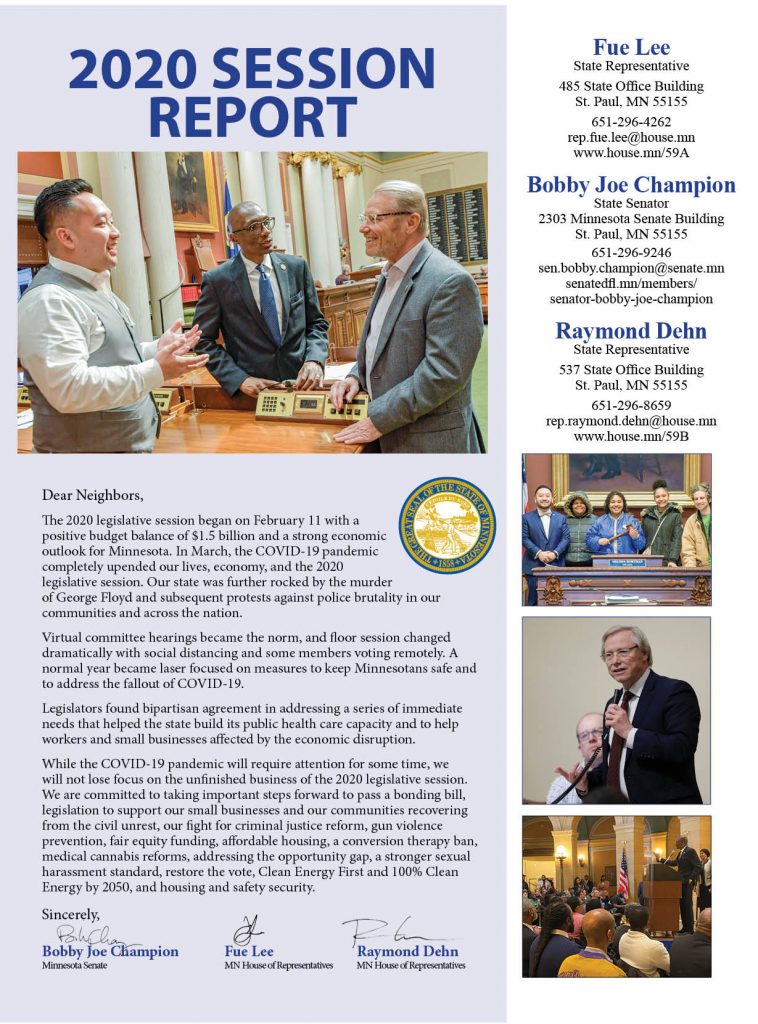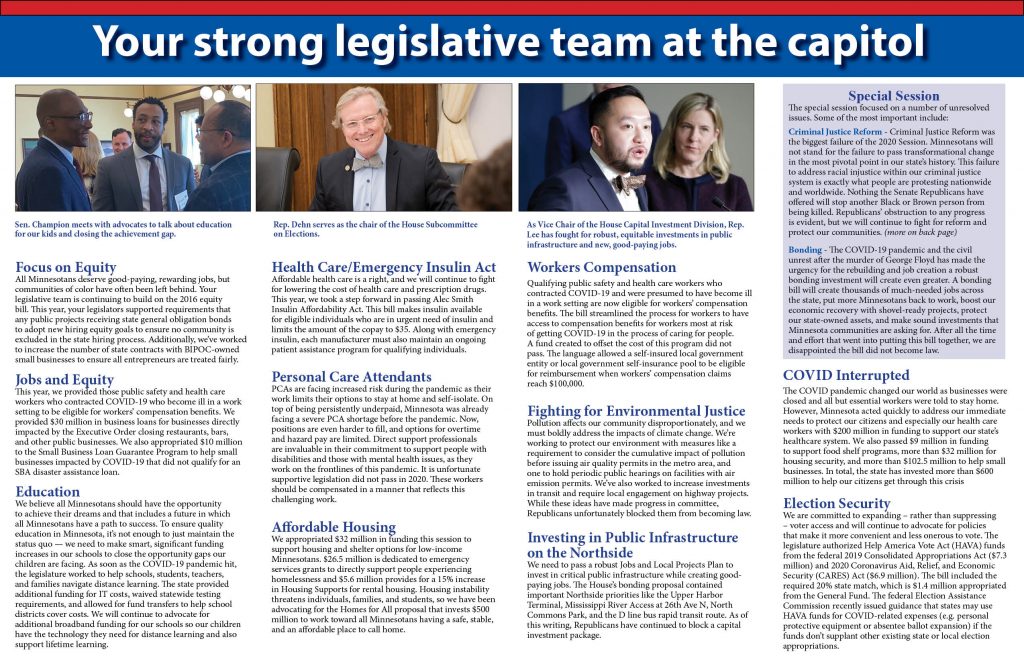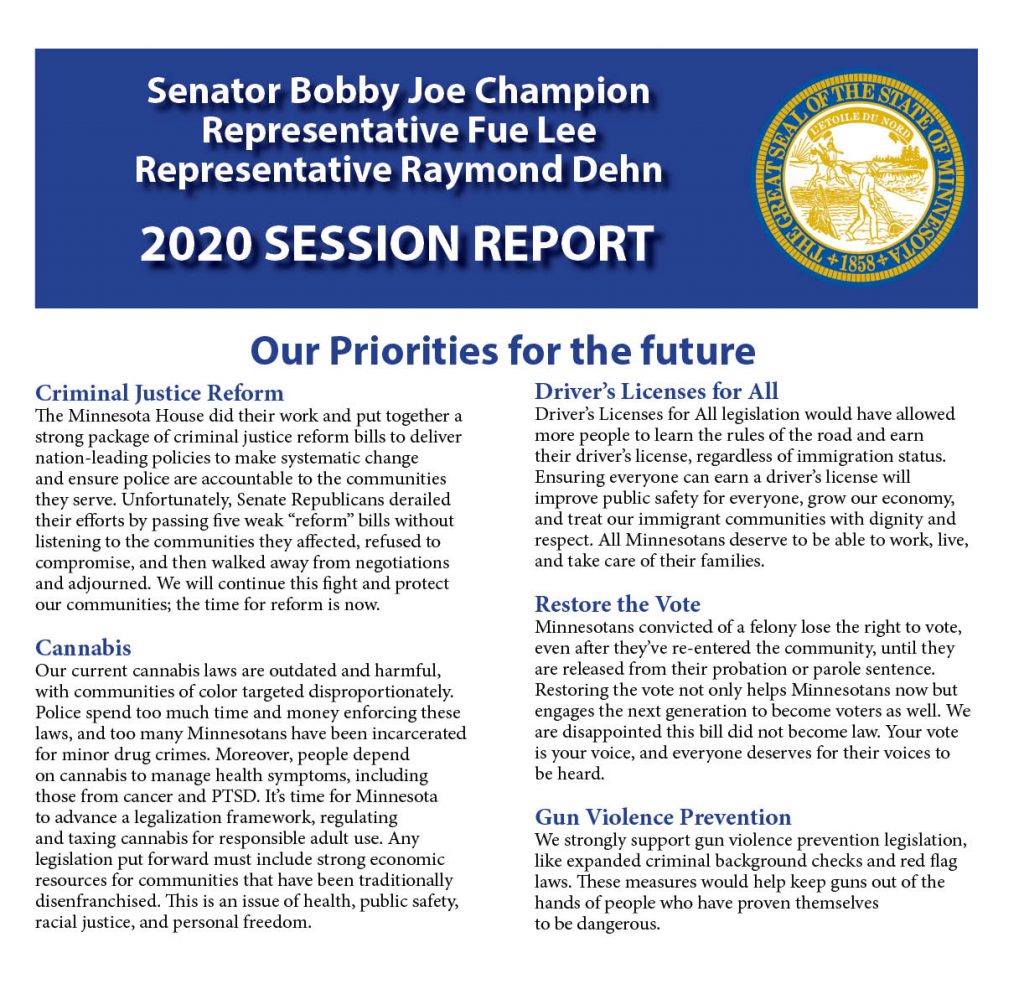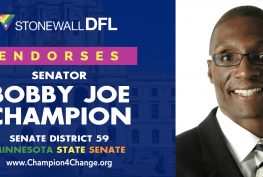All text appears below the images



2020 SESSION REPORT
Bobby Joe Champion
State Senator
2303 Minnesota Senate Building
St. Paul, MN 55155
651-296-9246
sen.bobby.champion@senate.mn
senatedfl.mn/members/senator-bobby-joe-champion
Fue Lee
State Representative
485 State Office Building
St. Paul, MN 55155
651-296-4262
rep.fue.lee@house.mn
Raymond Dehn
State Representative
537 State Office Building
St. Paul, MN 55155
651-296-8659
rep.raymond.dehn@house.mn
Dear Neighbors,
The 2020 legislative session began on February 11 with a positive budget balance of $1.5 billion and a strong economic outlook for Minnesota. In March, the COVID-19 pandemic completely upended our lives, economy, and the 2020 legislative session. Our state was further rocked by the murder of George Floyd and subsequent protests against police brutality in our communities and across the nation.
Virtual committee hearings became the norm, and floor session changed dramatically with social distancing and some members voting remotely. A normal year became laser focused on measures to keep Minnesotans safe and to address the fallout of COVID-19.
Legislators found bipartisan agreement in addressing a series of immediate needs that helped the state build its public health care capacity and to help workers and small businesses affected by the economic disruption. While the COVID-19 pandemic will require attention for some time, we will not lose focus on the unfinished business of the 2020 legislative session. We are committed to taking important steps forward to pass a bonding bill, legislation to support our small businesses and our communities recovering
from the civil unrest, our fight for criminal justice reform, gun violence prevention, fair equity funding, affordable housing, a conversion therapy ban, medical cannabis reforms, addressing the opportunity gap, a stronger sexual harassment standard, restore the vote, Clean Energy First and 100% Clean Energy by 2050, and housing and safety security.
Sincerely,
Bobby Joe Champion
Fue Lee
Raymond Dehn
Your strong legislative team at the capitol
Sen. Champion meets with advocates to talk about education for our kids and closing the achievement gap.
Special Session
The special session focused on a number of unresolved issues. Some of the most important include:
Criminal Justice Reform – Criminal Justice Reform was the biggest failure of the 2020 Session. Minnesotans will not stand for the failure to pass transformational change in the most pivotal point in our state’s history. This failure to address racial injustice within our criminal justice system is exactly what people are protesting nationwide and worldwide. Nothing the Senate Republicans have offered will stop another Black or Brown person from being killed. Republicans’ obstruction to any progress is evident, but we will continue to fight for reform and protect our communities. (more on back page)
Bonding – The COVID-19 pandemic and the civil unrest after the murder of George Floyd has made the urgency for the rebuilding and job creation a robust bonding investment will create even greater. A bonding bill will create thousands of much-needed jobs across the state, put more Minnesotans back to work, boost our economic recovery with shovel-ready projects, protect our state-owned assets, and make sound investments that Minnesota communities are asking for. After all the time and effort that went into putting this bill together, we are disappointed the bill did not become law.
Focus on Equity
All Minnesotans deserve good-paying, rewarding jobs, but communities of color have often been left behind. Your legislative team is continuing to build on the 2016 equity bill. This year, your legislators supported requirements that any public projects receiving state general obligation bonds to adopt new hiring equity goals to ensure no community is excluded in the state hiring process. Additionally, we’ve worked to increase the number of state contracts with BIPOC-owned small businesses to ensure all entrepreneurs are treated fairly.
Jobs and Equity
This year, we provided those public safety and health care workers who contracted COVID-19 who become ill in a work setting to be eligible for workers’ compensation benefits. We provided $30 million in business loans for businesses directly impacted by the Executive Order closing restaurants, bars, and other public businesses. We also appropriated $10 million to the Small Business Loan Guarantee Program to help small businesses impacted by COVID-19 that did not qualify for an SBA disaster assistance loan.
Education
We believe all Minnesotans should have the opportunity to achieve their dreams and that includes a future in which all Minnesotans have a path to success. To ensure quality
education in Minnesota, it’s not enough to just maintain the status quo — we need to make smart, significant funding increases in our schools to close the opportunity gaps our children are facing. As soon as the COVID-19 pandemic hit, the legislature worked to help schools, students, teachers, and families navigate distance learning. The state provided additional funding for IT costs, waived statewide testing requirements, and allowed for fund transfers to help school districts cover costs. We will continue to advocate for additional broadband funding for our schools so our children have the technology they need for distance learning and also support lifetime learning.
Rep. Dehn serves as the chair of the House Subcommittee on Elections.
As Vice Chair of the House Capital Investment Division, Rep. Lee has fought for robust, equitable investments in public infrastructure and new, good-paying jobs.
Health Care/Emergency Insulin Act
Affordable health care is a right, and we will continue to fight for lowering the cost of health care and prescription drugs. This year, we took a step forward in passing Alec Smith Insulin Affordability Act. This bill makes insulin available for eligible individuals who are in urgent need of insulin and limits the amount of the copay to $35. Along with emergency insulin, each manufacturer must also maintain an ongoing patient assistance program for qualifying individuals.
Personal Care Attendants
PCAs are facing increased risk during the pandemic as their work limits their options to stay at home and self-isolate. On top of being persistently underpaid, Minnesota was already facing a severe PCA shortage before the pandemic. Now, positions are even harder to fill, and options for overtime and hazard pay are limited. Direct support professionals are invaluable in their commitment to support people with disabilities and those with mental health issues, as they work on the frontlines of this pandemic. It is unfortunate supportive legislation did not pass in 2020. These workers should be compensated in a manner that reflects this challenging work.
Affordable Housing
We appropriated $32 million in funding this session to support housing and shelter options for low-income Minnesotans. $26.5 million is dedicated to emergency services grants to directly support people experiencing homelessness and $5.6 million provides for a 15% increase in Housing Supports for rental housing. Housing instability threatens individuals, families, and students, so we have been advocating for the Homes for All proposal that invests $500 million to work toward all Minnesotans having a safe, stable, and an affordable place to call home.
Election Security
We are committed to expanding – rather than suppressing – voter access and will continue to advocate for policies that make it more convenient and less onerous to vote. The legislature authorized Help America Vote Act (HAVA) funds from the federal 2019 Consolidated Appropriations Act ($7.3 million) and 2020 Coronavirus Aid, Relief, and Economic Security (CARES) Act ($6.9 million). The bill included the required 20% state match, which is $1.4 million appropriated from the General Fund. The federal Election Assistance Commission recently issued guidance that states may use HAVA funds for COVID-related expenses (e.g. personal protective equipment or absentee ballot expansion) if the funds don’t supplant other existing state or local election appropriations.
Workers Compensation
Qualifying public safety and health care workers who contracted COVID-19 and were presumed to have become ill in a work setting are now eligible for workers’ compensation benefits. The bill streamlined the process for workers to have access to compensation benefits for workers most at risk of getting COVID-19 in the process of caring for people. A fund created to offset the cost of this program did not pass. The language allowed a self-insured local government entity or local government self-insurance pool to be eligible for reimbursement when workers’ compensation claims reach $100,000.
Fighting for Environmental Justice
Pollution affects our community disproportionately, and we must boldly address the impacts of climate change. We’re working to protect our environment with measures like a requirement to consider the cumulative impact of pollution before issuing air quality permits in the metro area, and one to hold periodic public hearings on facilities with air emission permits. We’ve also worked to increase investments in transit and require local engagement on highway projects. While these ideas have made progress in committee, Republicans unfortunately blocked them from becoming law.
Investing in Public Infrastructure on the Northside
We need to pass a robust Jobs and Local Projects Plan to invest in critical public infrastructure while creating good-paying jobs. The House’s bonding proposal contained important Northside priorities like the Upper Harbor Terminal, Mississippi River Access at 26th Ave N, North Commons Park, and the D line bus rapid transit route. As of this writing, Republicans have continued to block a capital investment package.
COVID Interrupted
The COVID pandemic changed our world as businesses were closed and all but essential workers were told to stay home. However, Minnesota acted quickly to address our immediate needs to protect our citizens and especially our health care workers with $200 million in funding to support our state’s healthcare system. We also passed $9 million in funding to support food shelf programs, more than $32 million for housing security, and more than $102.5 million to help small businesses. In total, the state has invested more than $600 million to help our citizens get through this crisis.
Our Priorities for the future
Criminal Justice Reform
The Minnesota House did their work and put together a strong package of criminal justice reform bills to deliver nation-leading policies to make systematic change and ensure police are accountable to the communities they serve. Unfortunately, Senate Republicans derailed their efforts by passing five weak “reform” bills without listening to the communities they affected, refused to compromise, and then walked away from negotiations and adjourned. We will continue this fight and protect our communities; the time for reform is now.
Cannabis
Our current cannabis laws are outdated and harmful, with communities of color targeted disproportionately. Police spend too much time and money enforcing these laws, and too many Minnesotans have been incarcerated for minor drug crimes. Moreover, people depend on cannabis to manage health symptoms, including those from cancer and PTSD. It’s time for Minnesota to advance a legalization framework, regulating and taxing cannabis for responsible adult use. Any legislation put forward must include strong economic resources for communities that have been traditionally disenfranchised. This is an issue of health, public safety, racial justice, and personal freedom.
Driver’s Licenses for All
Driver’s Licenses for All legislation would have allowed more people to learn the rules of the road and earn their driver’s license, regardless of immigration status. Ensuring everyone can earn a driver’s license will improve public safety for everyone, grow our economy, and treat our immigrant communities with dignity and respect. All Minnesotans deserve to be able to work, live, and take care of their families.
Restore the Vote
Minnesotans convicted of a felony lose the right to vote, even after they’ve re-entered the community, until they are released from their probation or parole sentence. Restoring the vote not only helps Minnesotans now but engages the next generation to become voters as well. We are disappointed this bill did not become law. Your vote is your voice, and everyone deserves for their voices to be heard.
Gun Violence Prevention
We strongly support gun violence prevention legislation, like expanded criminal background checks and red flag laws. These measures would help keep guns out of the hands of people who have proven themselves to be dangerous.






No Comments